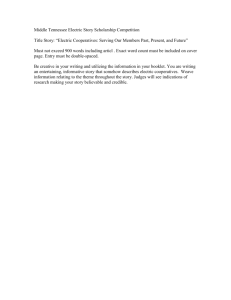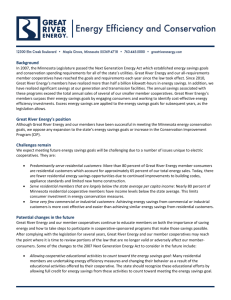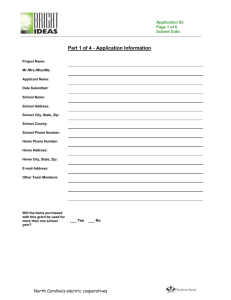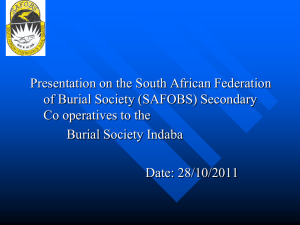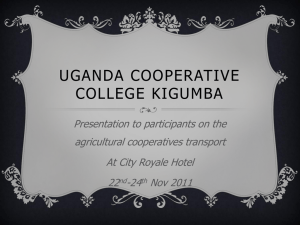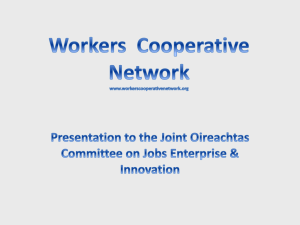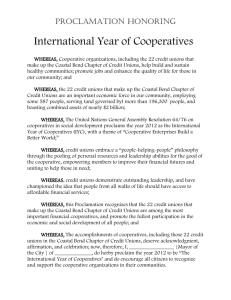Powerpoint – Social Economy in Turkey - The Co
advertisement
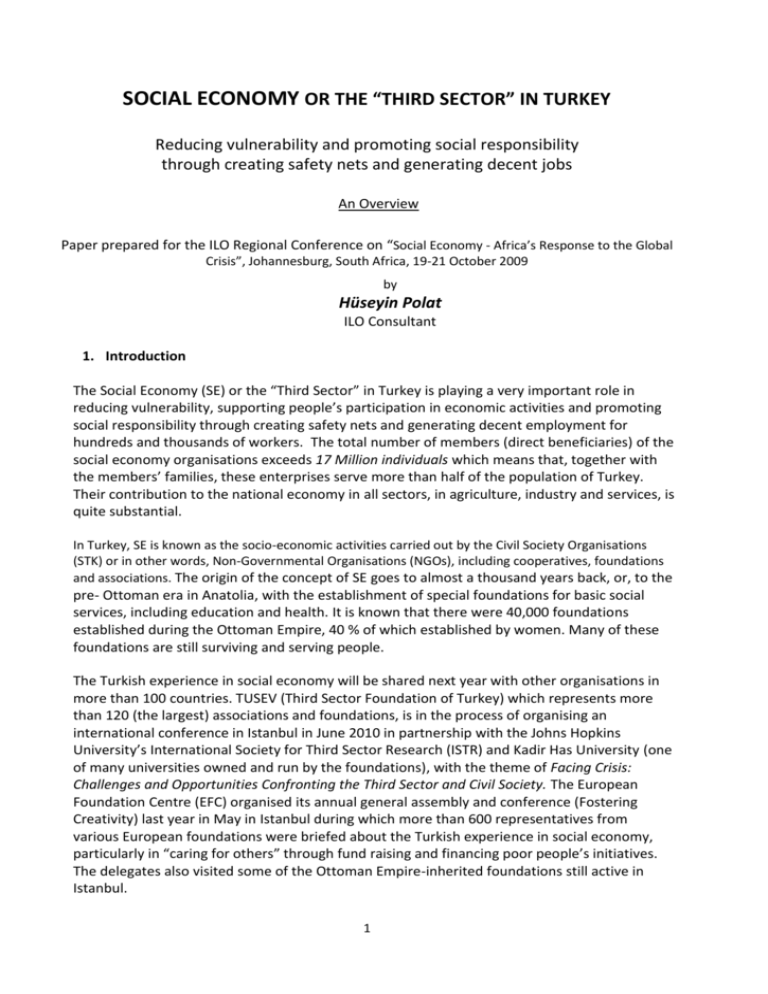
SOCIAL ECONOMY OR THE “THIRD SECTOR” IN TURKEY Reducing vulnerability and promoting social responsibility through creating safety nets and generating decent jobs An Overview Paper prepared for the ILO Regional Conference on “Social Economy - Africa’s Response to the Global Crisis”, Johannesburg, South Africa, 19-21 October 2009 by Hüseyin Polat ILO Consultant 1. Introduction The Social Economy (SE) or the “Third Sector” in Turkey is playing a very important role in reducing vulnerability, supporting people’s participation in economic activities and promoting social responsibility through creating safety nets and generating decent employment for hundreds and thousands of workers. The total number of members (direct beneficiaries) of the social economy organisations exceeds 17 Million individuals which means that, together with the members’ families, these enterprises serve more than half of the population of Turkey. Their contribution to the national economy in all sectors, in agriculture, industry and services, is quite substantial. In Turkey, SE is known as the socio-economic activities carried out by the Civil Society Organisations (STK) or in other words, Non-Governmental Organisations (NGOs), including cooperatives, foundations and associations. The origin of the concept of SE goes to almost a thousand years back, or, to the pre- Ottoman era in Anatolia, with the establishment of special foundations for basic social services, including education and health. It is known that there were 40,000 foundations established during the Ottoman Empire, 40 % of which established by women. Many of these foundations are still surviving and serving people. The Turkish experience in social economy will be shared next year with other organisations in more than 100 countries. TUSEV (Third Sector Foundation of Turkey) which represents more than 120 (the largest) associations and foundations, is in the process of organising an international conference in Istanbul in June 2010 in partnership with the Johns Hopkins University’s International Society for Third Sector Research (ISTR) and Kadir Has University (one of many universities owned and run by the foundations), with the theme of Facing Crisis: Challenges and Opportunities Confronting the Third Sector and Civil Society. The European Foundation Centre (EFC) organised its annual general assembly and conference (Fostering Creativity) last year in May in Istanbul during which more than 600 representatives from various European foundations were briefed about the Turkish experience in social economy, particularly in “caring for others” through fund raising and financing poor people’s initiatives. The delegates also visited some of the Ottoman Empire-inherited foundations still active in Istanbul. 1 In this report, brief information will be given on the Social Economy and social economy enterprises in Turkey. 2. Definition In the European Union’s Manual for Drawing up the Satellite Accounts of Companies in the Social Economy, a definition of SE is made as follows1: The set of private, formally-organised enterprises, with autonomy of decision and freedom of membership, created to meet their members’ needs through the market by producing goods and providing services, insurance and finance, where decision-making and any distribution of profits or surpluses among the members are not directly linked to the capital or fees contributed by each member, each of whom has one vote. As stated in another EU document, common characteristics of the social economy enterprises are that their primary purpose is not to obtain a return on capital. They contribute to a more efficient market competition, they work according to the principles of the principle of solidarity and mutuality, and managed by the members on the basis of the rule "one person, one vote. In addition, they are flexible and innovative and they are based on active membership2. 3. SE categories in Turkey The social economy enterprises in Turkey are grouped into four main categories as follows: - Cooperatives Foundations Associations (including professional/vocational associations and mutual assistance funds, working similar to SACCOs (yardimlasma dernegi) Trade unions (through their socio-economic establishments for primarily their members and families). This last category, trade unions, includes shopfloor-level canteens and worker-owned and run consumer and housing cooperatives, day-care centres, recreational facilities, hotels and guest houses, student dormitories, etc., which will be explained in detail later. 4. Legal basis of SE in Turkey The social economy organisations and enterprises are established under various laws, as pointed out below, depending on their categories: - Cooperatives are established according to three main laws: Law No. 1163 (1969) is a general law for all types of cooperatives except agricultural credit and agricultural sales cooperatives. The agricultural credit cooperatives are established and governed under 1 The Social Economy in the European Union, CIRIEC Survey by Rafael CHAVES & José Luis MONZÓN CAMPOS, http://www.eesc.europa.eu/groups/3/index_en.asp?id=1405GR03EN 2 http://ec.europa.eu/enterprise/index_en.htm 2 - Law No. 1581 (1972) -which was revised in 2005 with the Law No. 5330. The agricultural sales cooperatives come under the Law No. 4572 (2000). Foundations are established and governed according to Law No. 5737 (2008). Associations are established according to Law No. 5253 (2004). Trade unions are formed according to Law No. 2821 (1983) and their economic and social establishments and enterprises are established according to Labour Law (No. 4857 of 2003), Foundations Law (No. 5737) and Associations Law (No. 5253). 5. Cooperatives: The strongest pillar of the Social Economy With a total membership of 8,5 million people, organized in more than 87,000 primary cooperatives, the cooperative sector comprises the largest and strongest pillar of the social economy. It is estimated that cooperatives have created more than 100 thousand jobs. Because of their important contribution to the national economy in rural and urban areas, cooperatives are generally known to be the driving force in the social economy. A brief picture of the movement by sector is drawn below to highlight its importance in social and economic life in Turkey. 5.1 Agricultural Credit Cooperatives (ACC): Established on the same or similar organization model of the Raiffeisen Cooperatives in Germany, the ACC is the oldest and economically the largest cooperative group in Turkey. The group has 1, 3 million farmer-members organized in 1,879 primary ACCs, affiliated to 16 regional unions and a Central Union in Ankara. The group employs 5,652 workers and professionals. Although its primary function has been distribution of agricultural credit, it has developed additional services and become a multi-purpose cooperative system, owning and running 16 different and specialised production and processing plants including chemical fertilisers (the largest distributor of fertilisers and it owns 84% of the shares of the largest fertiliser factory (GUBRETAS), seeds (through its own company TAREKS), animal feed (through 7 animal feed factories), agricultural insecticides and agricultural machinery and tools. It has a shareholder and general agent of one of the largest insurance companies, and through this it provides agricultural insurance services for its members and their products. ACC has a sum of USD 128 million membership capital fully paid. By the end of 2008, total amount of agricultural credit distributed to its members is USD 1 Billion, which makes 19 % of the total agricultural credit distributed (second after the largest distributor, the Agricultural Bank with the share of 40%). ACC has its own facilities as office buildings (1,918 units) and 2,533 warehouses. It distributes between 900 and 1,000 tonnes of chemical fertilizers (worth USD 578 Million) every year. In the year 2008, ACC distributed also USD 88 Million worth of animal feed, USD 74 Million of seed, USD 190 Million of gasoline and USD 90 million consumer goods. Total sales of the other agricultural machinery and tools reached USD 100 Million. ACC has organised 48 courses in 2008 and trained 2,533 personnel and cooperative members. In summary, it is reported that the total business volume of the ACC group has exceeded 2, 5 Billion US Dollars at the end of 20083. 3 http://www.tarimkredi.org.tr/ 3 5.2 Agricultural Sales Cooperatives (ASC) ASCs have 602,248 members organised in 322 primary cooperatives affiliated to 17 productbased and specialised cooperative unions. These cooperatives and their unions employ 7,000 workers and work on purchasing, processing and sale of 21 different agricultural products, most of which are considered to be strategically important for the country’s economy. These products include cotton, hazel nut, ground nut, olive and olive oil, figs, grapes, beans, cereals, sunflower oil, silk worm, wool, rose flower, fresh fruit and vegetables, etc. Despite financial difficulties they have been facing in recent years and because of the long-lasting process of reorganisation, ASCs are still economically very strong and hold almost 100% market share in purchasing and processing of many of the above-mentioned products in their regions4. 5.2 Sugar Beet Production Cooperatives (PANKOBIRLIK) 1, 6 million sugar beet producers organized themselves in 31 primary cooperatives affiliated to the Union of Sugar Beet Producers’ Cooperatives, PANKOBIRLIK. These cooperatives own 7 sugar production factories and 5 specialised companies. These are the major economic indicators of sugar beet cooperatives5: 42 % of the country’s sugar production; 802 million USD of paid capital; total jobs created 7,300; 165 Million USD production credit distributed to members; and volume of business 1, 65 Billion USD. 5.3 Other Agricultural Cooperatives There are other types of agricultural cooperatives whose numbers and total membership are given as follows6: - Rural (Village) development cooperatives: Total membership 790,037 organised in 7,503 primary cooperatives affiliated to 83 unions and 4 central unions. Irrigation cooperatives: Total membership 286,197 organised in 2,428 co-ops affiliated to 13 regional unions and 1 central union. Fishery cooperatives: 28,185 members organized in 522 co-ops affiliated to 14 regional unions and 1 central union. 5.4 Housing Cooperatives (HC) In terms of number of cooperatives and individual members, housing cooperatives constitute the largest segment of the cooperative movement with 59,129 cooperatives and 2,150,860 members. It is however not definitely known how many of these cooperatives are active and how many of them have been dormant or have already completed their functions, but not yet taken decision for dissolution. It should also be pointed out here that there has been very close and strong relationship between many of these cooperatives and trade unions, because of the concentration of union members within the overall membership of housing cooperatives. For instance, one of the most successful housing co-op projects with almost 50,000 dwellings, 4 Koop Strateji Belgesi, STB, 2009 (Cooperative Strategy Document, Ministry of Industry and Trade) www.pankobirlik.com.tr 6 Koop Strateji Belgesi, STB, 2009 5 4 KENT-KOOP, was created by mainly worker-owned housing cooperatives, supported by trade unions. The share of cooperatives in the housing construction sector had reached to 36 % in 1980s and 1990s due to easy access to the low-cost mass-housing credit opportunities. This percentage has reduced considerably in recent years, particularly after the year 2000, down to 6 %7, due to, to a large extent, introduction of centralized, and uncompetitive policies in housing market, as well as the ongoing global financial crisis. Priority in using housing credit was given to TOKI (Mass Housing Administration), a State-owned company, which made the life unbearable for housing cooperatives. At present, housing cooperatives are striving to survive under these unfavourable market conditions and policy environment. 5.5 Artisanal Guarantee and Credit Cooperatives (TESKOMB) These cooperatives are established by small artisans and traders (small entrepreneurs) mainly working on their own, to obtain credit, on a group-collateral basis, from mainly the Turkish People’s Bank (HALKBANK). There are at present 899 cooperatives with 670,000 members, affiliated to 32 regional unions and a central union in Ankara, TESKOMB. There is a service company, ESGIMTAS, established by TESKOMB to provide support services to primary cooperatives8. At present, the total amount of TESKOMB credits is around USD 2 Billion, and 50 % of its interest is subsidised by the State. 5.6 Transport cooperatives This is another type of cooperative widespread all over Turkey. There are at present 6,443 transport cooperatives having 195,680 members, affiliated to 36 regional unions and one central union. 5.7 Other types of “urban” cooperatives Other major cooperatives and their numbers are given below9: - Consumer cooperatives: 3,229 co-op society with 305,504 members, 20 regional unions and a central union. They need particular attention to be able to survive. Work shed construction co-ops: 1,928 co-ops with 117,099 members. Tourism development co-ops: 397 co-ops with 17,893 members. Production and marketing co-ops: 500 co-ops with 26,696 members. 6. Foundations According to TUSEV (Third Sector Foundation of Turkey), there are 4,500 foundations in Turkey, out of which the largest 120 are members of TÜSEV. Through its recently launched Social Investment Initiative, TUSEV seeks to increase the effectiveness and flow of resources to the third sector by introducing new approaches and convening government, private and third sector actors to explore new mechanisms which can enable charitable giving for civil society 7 Ibid, page 16. www.teskomb.org.tr 9 Koop Strateji Belgesi, STB, p. 12. 8 5 organizations in Turkey10. TUSEV launched the publication of Philanthropy in Turkey: Citizens, Foundations and the Pursuit of Social Justice. The publication is a compendium of four comprehensive studies revealing key insights on the history of foundations in the Ottoman Era, foundation operations and challenges in modern Turkey, and individual giving and philanthropy. This includes findings regarding the role of religion and practice of philanthropy in a predominantly Muslim society and the extent to which philanthropy in Turkey espouses a social justice perspective. There are 34 universities in Turkey owned by the foundations. The largest bank of Turkey (Is Bankasi) is owned by the foundation of the 17,500 staff members of the bank. Mutual Assistance Foundation of Military Staff (OYAK) is another strong foundation in Turkey with more than 200 thousand members, 26 establishments and 16,585 workers. A special foundation on Fight against Soil Erosion and Forestation (TEMA) has been active both at grassroots level with various projects as well as at policy level through lobbying to promote environment-friendly policies. In the health sector, there are very successful foundations established by the medical staff and handicapped people. Although there is no statistical data about the contribution of foundations to employment creation, it is believed that the number of jobs created by the foundations well exceeds several hundred thousands. By Oct. 2008, here are the numbers of foundations working in different categories11: 7. Social assistance: 1,906 (42 % of the total) Education: 1,105 (24 %) Culture: 605 Donations/Charity: 519 Health: 259 Others: 77. Associations and Mutual Assistance Funds By October 2008, there are 80,757 associations and mutual assistance funds (yardimlasma dernegi) in Turkey12. Total number of members of these associations and funds is 8, 6 million. Total number of jobs created by these associations and their establishments is believed to be around 250 thousand. The number of associations and mutual assistance funds according to major categories is given below: - Social assistance: 5,434 Mutual assistance (funds): 13,382 Environment: 1,243 Professional solidarity: 7,913 Townsmanship, women : 9,108 Civil and human rights: 791 Youth: 528 Culture: 3,003 Health: 1,893 10 www.tusev.org.tr/ www.kurumsalsosyal.com 12 www.kurumsalsosyal.com and Ankara Chamber of Commerce survey, 2008. 11 6 - Sports: 13,860 Development: 1,494 Religion: 14,744 Others: 5,501. It should be pointed out that these associations, and particularly the mutual assistance associations (funds) which work similar to the savings and credit cooperatives (SACCOs), play a very important role in reducing social tensions and increasing the level of endurance of working people during financial crisis through micro credit and other social and community services. It is therefore widely accepted in the society that cooperatives and mutual assistance associations are safety nets of the civil society. There are very large mutual assistance associations, like ILKSAN, established in 1943, the Primary School Teachers’ Health and Social Assistance Association (Fund) with more than 250 thousand members and several establishments and service units throughout Turkey. Another one which was established in 1952 by the staff of the security department (POLSAN) with more than 100 thousand members and several economic and social enterprises and an insurance company (Ankara Sigorta). Other examples include the PTT Staff Savings and Credit Association with 17,500 members, Turk Telecom Staff Savings and Credit Association with 17,000 members, the (historic) Mine Workers Association established in 1920s (Amele Birligi) with 12,500 members. There are also thousands of workers’ and civil servants’ associations established within large public and private work places, whose membership varies from few hundreds to several thousands. There are also interesting ones such as Women Entrepreneurs Association (KAGIDER) supporting women groups to start and develop business through training and consultancy services (funded by the EU) among women. 8. Trade unions’ service units and social enterprises In addition to their fundamental functions (collective bargaining and other activities to protect and promote workers’ rights), trade unions have also some non-bargaining activities for the benefit of their members. These non-bargaining activities are grouped into the following categories: - Promotion of and support to consumer and housing cooperatives of members, Support to mutual assistance funds (similar to SACCOs) of workers to strengthen access to credit for their members and families, Taking part in consumer protection and advocacy activities, and Establish and run social service units for their members as well as for the community. On this last category, some unions are quite successful. Here are some examples: - Metal Workers Union (Turk Metal) has three hotels (4-star) one being outside of Turkey, five social centres and guest houses for members and one old-age home. Energy Workers Union (Tes-Is): Five hotels (4-star) and one holiday resort. Construction Workers Union (Yol-Is): Two hotels (4-star) and a guest house. Railway Workers Union (Demiryol-Is): Two holiday resorts, one multi-purpose meeting hall (wedding) and two guest houses. 7 - Sugar Industry Workers Union (Seker-Is): One hotel (4-star), one guest house, one restaurant, shareholder of Sugar Foundation and Sugar Insurance. Agriculture Workers Union (Tarim-Is): One hotel (4-star) and one guest house. Textile Workers Union (Teksif): Two holiday resorts and one guest house Cooperative and Office Workers Union (Koop-Is): One guest house. 9. The impact of global financial crisis in Turkey and social economy Turkey entered the current crisis with a relatively high level of private external debt and a large current account deficit. So the global crisis has also affected Turkey through financial channels: a decline in private external capital flows and a crunch in trade finance13. The impact of global financial crisis in Turkey on economy as well as on social life has therefore been tremendous. Unemployment rate has increased from 11 to almost 20 %. The number of SMEs closed due to the crisis has also tripled compared to last year. According to the Employers’ Confederation TISK, unemployment among young people has increased 28, 7 % in May 200914. According to TISK, the number of companies closed between the period of Jan-July 2009 has increased to 3602, an 18 % increase compared to the same period of 2008. The number of individuallyowned businesses closed is much higher. According to the Trade Registration Gazette, 25,198 individually-owned businesses were closed during the same period15. Towards the end of 2008, the Ministry of Industry and Trade (STB) asked the major cooperative unions to inform about the impact of the financial crisis on cooperatives and remedies to be taken to reduce the impact. A report was prepared by the Ministry on the basis of the responses given by some of the cooperatives’ apex organisations. The most severely-hit cooperatives, the report says, are some of the agricultural sales cooperatives (ASCs), particularly those dealing with the purchase and sale of cotton, hazel nut and oliveand sunflower-oil cooperative unions, due to difficulties in paying for the produce purchased from member-farmers, selling the produce and collecting the debts16. Following these co-ops, two other types are also severely affected, housing and consumers cooperatives. The impact of financial crisis on housing sector has also been felt seriously. The Central Union of Urban Housing Cooperatives TURK-KENT pointed out, in the report prepared for the abovementioned request of the Ministry, that due to the crisis, the share of housing cooperatives in the housing construction market has dropped sharply to almost a negligible level (6,5%)17. However, on this sharp drop, the Ministry of Industry and Trade has different opinion. According to the Ministry, it is because of the change of policy environment to support TOKI, not the financial crisis, which has less impact on housing cooperatives in the housing construction sub-sector. 13 Ngozi Okonjo-Iweala, Managing Director, The World Bank, keynote address: The Global Financial Crisis and Turkey, TUSIAD’s High Advisory Council Meeting, Bodrum, June 18, 2009. 14 TISK Aylık Ekonomi Bulteni, Aug. 2009. 15 Report prepared by the Directorate-General of Organisation, Min. of Industry and Trade, 2009. 16 “The Reflections of the Global Financial Crisis on the Turkish Cooperative Sector”, report prepared by the Department of Organisation, Min. of Industry and Trade, 2009 (unpublished). 17 Aydogus Serpil, editor, report on the impact of global crisis on urban (housing) cooperatives, Jan. 2009 (www.turkkent.coop) 8 According to the General Manager of the Central Union of Agricultural Credit Cooperatives, ACCs have affected from the crisis, particularly in the sales of agricultural inputs, but there were no serious reductions or delays in loan repayments of their members 18. There is no sufficient data and information about the impact of financial crisis on the work of other pillars of the social economy, foundations and associations. It is however believed that members and beneficiaries of these organisations and their enterprises have affected less compared to SMEs and other real sector companies. Many cooperatives in Turkey have used and referred to the announcement of the UN Secretary-General on the International Day of Cooperatives about the role of cooperatives in crisis. References were also made to the report prepared by the ILO on financial crisis and cooperatives19. 10. Conclusions and recommendations for future action In conclusion, despite widespread negative impact of the global financial crisis in Turkey on real sector enterprises, it can be said that the social economy enterprises, particularly cooperatives, were among those less-affected. In the above-mentioned report prepared by the Ministry of Industry and Trade, it is mentioned that due to the financial crisis, the total number of private companies and individually-owned businesses closed and liquidated during the period of JanJuly 2009, (40,993) is incomparably higher than the number of cooperatives closed and liquidated (3,142) during the same period. This proves that cooperatives are more resilient than other types of private businesses during the times of financial crisis. What needs to be done to further strengthen the resilience of social economy and reduce the impact of global financial crisis in Turkey? Here are a few suggestions: - - - The cooperative strategy document prepared by the Ministry of Industry and Trade, in partnership with the cooperative movement, should be put into action by both the Ministry and the movement. The document draws a road map for development of cooperatives for the period 2010-2014 with seven strategic targets: reorganisation of the cooperative support service infrastructure of the public; strengthening of education, information, research and development services; increasing the capacity of organisation and efforts for inter-cooperative collaboration; strengthening capital base of cooperatives and access to finance and credit; revising the entire system of internal and external audit in cooperatives; improvement of institutional and professional management capacity; and improvement of the legal framework for cooperatives to meet the needs in line with the relevant international standards20. Particular and immediate emphasis should be placed on developing and implementing support (and rescue) policies, programmes and projects for (urban) housing and consumer cooperatives, as these two types are among the severely-hit cooperatives, and low-income and poor people are in need of their services (to help people help themselves in building low-cost houses and easy access to food and basic commodities). In addition to cooperatives, foundations and associations also need policy support, including some tax exemptions, in order to continue their socially-responsible services through their social enterprises which are necessary as safety nets for millions of low-income and poor people. H. Polat, Ankara, 01.10.2009 18 Interview with Mr. B. Yildirim, Turk Tarim Magazine, May-June 2009. www.orkoop.org.tr/duyuru3/ 20 Cooperative Strategy document (2010-2014), Min of Industry and Trade. 19 9
